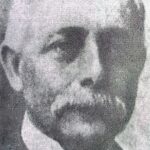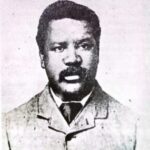NANA OFORI ATTA II
- 4 Min Read
Nana Ofori Atta II (March 13, 1899 – September 13, 1973) was Okyehene (paramount chief of Akyem Abuakwa, a state to the northwest of Accra) from 1943-1973. He is best remembered for his bold efforts to free chieftaincy from some of the obsolete customs and taboos which still tie it to the past, as well as for his resistance to its destruction as a result of the policies of Kwame Nkrumah and the Convention People’s Party (C.P.P), which exiled him from Akyem Abuakwa to Accra from 1958-1966.

PHOTO CAPTION: Nana Ofori Atta II SOURCE: EA Library
Born in 1899 to Kwame Akyeampon, a gold and silversmith in the service of Nana Kwasi Akuffo of Akuapim, and to Odehyee (member of the royalty) Elizabeth Amma Otiwaa, sister of Ofori Atta I, he was named Daniel Opoku Akyempon. He was educated between 1905-1915 at the Basel Mission School at Kyebi, a capital of Akyem Abuakwa, and at the Basel Mission Boarding School at Begoro, 20mi (32 km) northeast of Kyebi. Later, from 1916 to December 1919, he attended the Albert Academy in Sierra Leone.
On his return to the Gold Coast at the end of 1919, Daniel Opoku Akyempon, as a likely successor to the paramount stool of Akyem Abuakwa, remained at the Kyebi Palace for a few months to study the problems of state administration before taking up an appointment at New Tafo as a cocoa purchasing officer in 1920. From 1925-1927 he worked in the Accra Power Station as a mechanic. At the end of 1927 he returned to Kyebi where, between 1928 and 1943, he served as a staff member of the Akyem Abuakwa Native Authority, as treasurer of the Okyeman (Abuakwa state) Council, and as a member of the Kyebi Executive Council. On September 13, 1943, he was elected to succeed his late uncle, Nana Ofori Atta I as Okyehene.
Nana Ofori Atta II proved worthy of his great predecessor. A man of immense courage and strong convictions, he played an active part in the pre-independence politics of the Gold Coast. After first serving as the treasurer of the Joint Provincial Council of Chiefs, he became its president from 1948-54. In December 1948 he was appointed a member of the Coussey Constitutional Committee, which made recommendations which formed the basis for the 1951 constitution which represented a major step towards self-government for the Gold Coast. From 1951-1954, he served as a member of the Legislative Assembly as one of the members of the Eastern Provincial Council.
He was one of the most outspoken critics of Kwame Nkrumah and the C.P.P (founded 1949), against some of whose policies, especially those relating to the institution of Chieftaincy, he was fundamentally opposed. His support for the rival National Liberation Movement (N.L.M) made him unpopular both with the Nkrumah regime and with the C.P.P members in his state.
In November 1957 the Nkrumah regime, whose Minister of Local Government was Asante Ofori Atta, a nephew and opponent of the Okyehene, appointed the Jackson Commission to enquire into Nana Ofori Atta’s administration of Akyem Abuakwa. The Jackson Report, published on April 24, 1958, portrayed him in an unfavourable light, and the government withdrew its recognition from him as Okyehene. Nana Ofori Atta II was forcibly evicted from his palace at Kyebi on September 24, 1958 and was escorted from the town by 800 policemen.
For eight years Nana Ofori Atta II lived in exile in Accra, at first in the house of J.B. Danquah his uncle. After the overthrow of the Nkrumah regime, he returned to Kyebi on September 4, 1966, following the repeal by the National Liberation Council, which had come to power, of the order banning him from Kyebi. He was shortly after reinstated as Okyehene by the majority decision of his people.
He died in 1973. Apart from his other qualities, he is particularly remembered for his charm, affability, and generosity.
R. ADDO-FENING




